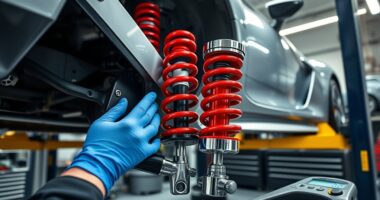New vehicle tuning regulations are tightening worldwide, focusing on stricter emissions standards, safety calibration, and regional legal differences. You must guarantee your modifications comply with local laws to avoid fines, penalties, or vehicle impoundment. Modern vehicles with advanced driver-assist systems require specialized calibration to maintain safety. Staying informed about these evolving rules helps you avoid legal trouble and attain peak performance. If you want to understand how to navigate these complex changes, there’s more you should know.
Key Takeaways
- Stricter emission standards now restrict certain performance modifications and require certified tuning solutions.
- Vehicles with ADAS need proper calibration after tuning to maintain safety and legal compliance.
- Regional laws vary; some areas impose outright bans or restrictions on aftermarket vehicle modifications.
- Industry is adopting advanced software and hardware to meet new environmental and safety regulations.
- Future trends favor electric and hybrid vehicle tuning, with increased costs and regulatory oversight for compliance.

Recent changes in vehicle tuning regulations are reshaping the industry, and if you’re involved in modifying cars, you’ll need to stay informed. New emission standards are tightening, making it more challenging to tweak vehicles without risking non-compliance. These stricter rules aim to reduce pollutants and greenhouse gases, which means your modifications must now meet higher environmental benchmarks. You might find that some popular tuning options, especially those that boost performance, are now restricted or require additional certification to guarantee they don’t violate emission limits.
Modern vehicles equipped with Advanced Driver Assistance Systems (ADAS) present another hurdle. When you modify or repair these vehicles, specialized calibration tools are necessary to guarantee safety features like automatic braking, lane assist, or adaptive cruise control work correctly. Ignoring these requirements could lead to safety issues or legal trouble. Regulatory agencies are increasingly scrutinizing aftermarket modifications on ADAS-equipped vehicles to ensure safety compliance. Additionally, the integration of vehicle telematics systems means that modifications must also account for data logging and communication protocols to avoid triggering alerts or malfunctions.
The legal landscape varies by location, with different regions adopting their own rules. Some areas impose restrictions on certain modifications altogether, especially if they compromise safety or emissions standards. Staying aware of your local regulations is essential, as non-compliance can result in fines, vehicle impoundment, or even legal action.
Technological advances are transforming how tuning is done, with more shops turning to sophisticated software and hardware to meet new standards. These tools allow for precise adjustments that help you stay compliant while still enhancing your vehicle’s performance.
Additionally, there’s a growing push toward eco-friendly upgrades, such as lighter materials and hybrid-compatible modifications, driven by regulations targeting sustainability. These eco-conscious options aren’t only better for the environment but also appealing to consumers seeking greener vehicles.
The push for zero-emission vehicles by 2035 in some states means that traditional internal combustion engine tuning is becoming less relevant. Instead, there’s a rising demand for electric and hybrid vehicle modifications. This shift presents new opportunities but also requires significant investment in training and technology for shops.
Costs associated with compliance can be high, especially for small businesses or individual tuners, who may need to upgrade their tools or learn new skills to keep up.
Legal and policy changes further influence the industry. The Federal Trade Commission has clarified that aftermarket add-ons are acceptable if they provide genuine value, which impacts how products are marketed and sold. Court decisions and regulatory clarifications continue to shape what modifications are permissible, emphasizing the importance of staying current with legal developments. [Staying compliant not only avoids penalties but also builds consumer trust in your business.
Frequently Asked Questions
How Will These Regulations Affect Existing Vehicle Modifications?
You’ll need to check if your current modifications meet the new emissions and safety standards. Some might require retrofitting or recalibration, especially exhaust, suspension, or safety features.
Certain mods could be grandfathered in, but it’s wise to stay updated on local laws. Keep in mind, enforcement will be stricter, so verify your vehicle remains compliant to avoid fines or registration issues.
Staying informed helps you adapt smoothly to these changes.
Are There Penalties for Non-Compliance With the New Rules?
You know what they say, “ignorance isn’t bliss,” and in this case, it’s costly. If you don’t follow the new rules, you risk hefty penalties, including fines, vehicle seizure, and even legal trouble.
Authorities enforce strict compliance, and repeated violations can stack up fines or lead to jail time. Stay informed and guarantee your modifications meet current standards to avoid these financial and legal consequences.
Will Tuning Shops Need Special Certifications Under the New Laws?
You might wonder if tuning shops need special certifications under new laws. Currently, federal regulations don’t require explicit certifications for shops, but state laws like California’s ACCII could impose stricter rules.
To stay compliant, you’ll need access to homologation documents, work through manufacturers for approvals, and maintain detailed records.
As regulations evolve, obtaining specific certifications for hybrid and EV modifications may become necessary to guarantee legality and avoid penalties.
How Do the Regulations Differ Between Passenger and Commercial Vehicles?
You should know that regulations differ markedly between passenger and commercial vehicles. Commercial vehicles often require more extensive modifications, like cargo equipment, which can change their registration class.
They face stricter safety, emissions, and inspection standards. Plus, registration involves additional documentation and compliance with business laws.
Passenger vehicles have simpler rules, while commercial vehicles are more heavily regulated due to their size, weight, and purpose on the road.
What Is the Timeline for Implementing and Enforcing These New Regulations?
You want to know the timeline for these new regulations. Starting April 3, 2025, passenger vehicles and light trucks will face import restrictions. Auto parts rules follow by May 3, 2025.
Enforcement efforts, including penalties for tampering, have been ongoing since 2020. Expect phased implementation, with federal agencies like EPA and NHTSA adjusting standards through 2032.
State laws may vary, so stay updated on local compliance deadlines.
Conclusion
As you embrace these new regulations, think of them as the map guiding your journey through the open road. Just like a compass keeps you on course, staying informed helps you navigate the world of vehicle tuning responsibly. Remember, your car’s potential is like a seed—nurtured by knowledge and care, it blooms into something extraordinary. Embrace these changes, and let them steer you toward a safer, more exciting ride ahead.









